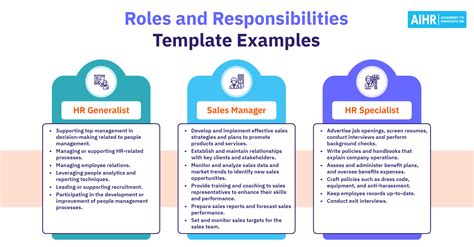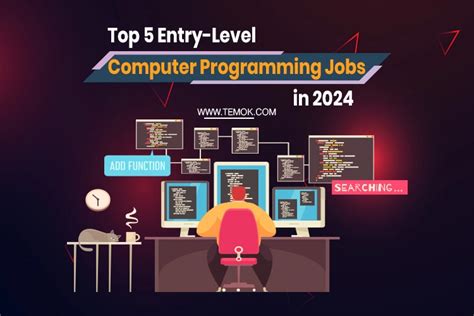Job Roles

The tech industry is a rapidly evolving landscape, and with its growth comes an ever-expanding array of job roles and opportunities. From the traditional coding positions to the more specialized and niche roles, the tech sector offers a diverse range of career paths. In this comprehensive guide, we will delve into the various job roles within the tech industry, exploring their responsibilities, skills required, and the impact they have on the digital world.
Software Development and Engineering

At the core of the tech industry lies software development and engineering. These roles involve creating, designing, and maintaining software applications and systems. Let's explore some key positions within this domain:
Software Developer
Software developers are the backbone of the tech world. They are responsible for writing code, developing software solutions, and ensuring the functionality and performance of applications. With a strong foundation in programming languages like Python, Java, or C++, software developers bring ideas to life. They collaborate with designers, project managers, and other stakeholders to translate requirements into working software.
| Key Skills | Relevant Tools |
|---|---|
| Proficiency in Programming Languages | Integrated Development Environments (IDEs) |
| Problem-Solving Abilities | Version Control Systems (e.g., Git) |
| Attention to Detail | Code Review Tools |

Software Engineer
Software engineers take a more holistic approach to software development. They not only write code but also focus on the design, architecture, and implementation of software systems. These professionals ensure that software solutions are scalable, efficient, and maintainable. Software engineers often work closely with architects and project leads to make high-level design decisions and implement complex software architectures.
| Skills Required | Technologies Used |
|---|---|
| Strong Algorithmic and Design Skills | Containerization (e.g., Docker) |
| Understanding of Software Development Lifecycle | Cloud Computing Platforms (e.g., AWS, Azure) |
| Ability to Work with Large Codebases | Microservices Architecture |
Web Development and Design

The web is a vast digital realm, and web development and design professionals are the architects of this online universe. Let's explore the roles that shape the user experience and the aesthetics of the web:
Web Developer
Web developers are the wizards behind the scenes, bringing websites and web applications to life. They work with various technologies to create dynamic and interactive web experiences. Front-end developers focus on the user interface, ensuring a seamless and visually appealing experience, while back-end developers handle server-side operations, databases, and ensuring the smooth functioning of the website.
| Front-end Skills | Back-end Skills |
|---|---|
| HTML, CSS, JavaScript | Python, Ruby, PHP |
| Responsive Design | Database Management (e.g., MySQL, MongoDB) |
| User Experience (UX) Design | Web Security |
Web Designer
Web designers are the artists of the web. They create visually stunning and user-friendly interfaces. Using their creative skills and understanding of design principles, web designers craft websites that not only look appealing but also provide an intuitive user experience. They work closely with developers to translate their designs into functional websites.
| Design Proficiency | Tools of the Trade |
|---|---|
| Graphic Design Skills (e.g., Adobe Creative Suite) | Design Software (e.g., Sketch, Figma) |
| Understanding of Color Theory and Typography | Wireframing and Prototyping Tools |
| Knowledge of UI/UX Best Practices | Version Control for Design Assets |
Data Science and Analytics
In today's data-driven world, data science and analytics play a crucial role in helping businesses make informed decisions. Let's uncover the roles that unlock the power of data:
Data Scientist
Data scientists are the detectives of the tech world, extracting valuable insights from vast datasets. They use statistical methods, machine learning algorithms, and data visualization techniques to uncover patterns, trends, and correlations. Data scientists work with businesses to solve complex problems, optimize processes, and make data-backed strategic decisions.
| Skills and Tools | Technologies |
|---|---|
| Proficiency in Statistical Analysis | Python, R |
| Machine Learning Expertise | Data Visualization Libraries (e.g., Matplotlib, Seaborn) |
| Data Wrangling and Cleaning | Big Data Technologies (e.g., Hadoop, Spark) |
Data Analyst
Data analysts are the bridge between data and decision-makers. They gather, clean, and analyze data to provide actionable insights. Data analysts work closely with business stakeholders to understand their needs and present data in a clear and concise manner. Their role is crucial in helping organizations make informed choices and optimize their strategies.
| Core Skills | Tools for Analysis |
|---|---|
| Strong Analytical Mindset | Microsoft Excel, Google Sheets |
| Data Visualization Techniques | Tableau, Power BI |
| SQL Querying | Data Analytics Platforms (e.g., Metabase, Looker) |
Cybersecurity and Network Engineering
As technology advances, so do the threats to digital systems. Cybersecurity and network engineering professionals are the guardians of the digital realm, ensuring the security and integrity of networks and data.
Cybersecurity Specialist
Cybersecurity specialists are on the front lines of the digital battle against cyber threats. They design and implement security measures, monitor systems for potential breaches, and respond to security incidents. These professionals stay updated with the latest threats and vulnerabilities, working to fortify organizations against cyberattacks.
| Specialized Skills | Security Tools |
|---|---|
| Network Security | Firewalls, IDS/IPS Systems |
| Ethical Hacking and Penetration Testing | Security Information and Event Management (SIEM) |
| Cryptographic Protocols | Virtual Private Networks (VPNs) |
Network Engineer
Network engineers are the architects of the digital infrastructure. They design, implement, and maintain computer networks, ensuring smooth and secure connectivity. These professionals work with various network devices, protocols, and topologies to create robust and efficient network architectures.
| Network Engineering Expertise | Network Technologies |
|---|---|
| Routing and Switching | Cisco, Juniper Networks |
| Network Security Protocols | VPN Technologies |
| Network Troubleshooting | Cloud-based Networking Solutions |
Artificial Intelligence and Machine Learning

The field of artificial intelligence (AI) and machine learning (ML) is rapidly transforming industries and pushing the boundaries of what technology can achieve. Let's explore the roles driving this revolution:
AI/ML Engineer
AI/ML engineers are the brains behind intelligent systems. They design and develop algorithms, models, and applications that leverage AI and ML techniques. These engineers work on projects ranging from natural language processing to computer vision, enabling machines to learn and make intelligent decisions.
| AI/ML Skills | Technologies and Frameworks |
|---|---|
| Machine Learning Algorithms | TensorFlow, PyTorch |
| Deep Learning | Natural Language Processing (NLP) Libraries |
| Computer Vision | Reinforcement Learning Frameworks |
AI/ML Researcher
AI/ML researchers are at the forefront of innovation, pushing the boundaries of AI and ML technologies. They conduct research, explore new algorithms, and develop cutting-edge solutions. These researchers collaborate with industry and academia to advance the field of AI and contribute to its practical applications.
| Research Focus | Collaborative Platforms |
|---|---|
| Computer Vision Research | Research Communities (e.g., arXiv, NeurIPS) |
| Natural Language Processing Research | Collaborative Research Projects |
| AI Ethics and Bias Research | Open-Source AI Projects |
Conclusion: Embracing the Diverse Tech Landscape
The tech industry offers an incredible array of job roles, each with its own unique set of skills and responsibilities. From software development to data science, web design to cybersecurity, and AI to network engineering, there is a role for every tech enthusiast. Embracing this diverse landscape allows individuals to find their niche and contribute to the ever-evolving digital world.
As technology continues to advance and shape our lives, the demand for skilled professionals in these roles will only grow. By understanding the various job roles and their impact, individuals can make informed career choices and embark on exciting journeys in the tech industry.
Frequently Asked Questions
What are the key skills required for a career in software development?
+
Software development requires a strong foundation in programming languages, problem-solving abilities, and attention to detail. Proficiency in languages like Python, Java, or C++ is essential. Additionally, software developers should have a good understanding of software development methodologies, version control systems, and debugging techniques.
How does a web designer contribute to the user experience of a website?
+
Web designers play a crucial role in shaping the user experience. They use their design skills and knowledge of UI/UX principles to create visually appealing and intuitive interfaces. By considering factors like color schemes, typography, and layout, web designers ensure that users have a seamless and enjoyable experience while navigating a website.
What are the key responsibilities of a data analyst?
+
Data analysts gather, clean, and analyze data to provide insights and support decision-making. They work closely with stakeholders to understand their needs and present data in a clear and actionable manner. Key responsibilities include data visualization, statistical analysis, and providing recommendations based on data-driven findings.
How do AI/ML engineers contribute to the development of intelligent systems?
+
AI/ML engineers are responsible for designing and developing algorithms and models that enable machines to learn and make intelligent decisions. They work with machine learning frameworks and tools to create applications in areas such as natural language processing, computer vision, and recommendation systems. Their work drives the advancement of AI technologies and their practical applications.



